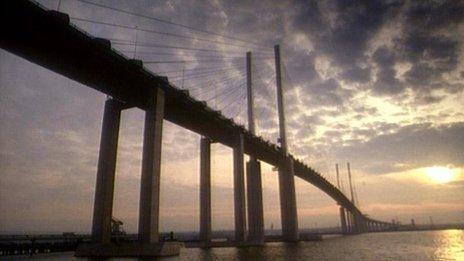Thames river crossing: Arguments for and against
- Published

Three locations have been put forward as possible sites for a new Lower Thames road crossing
The government has said a new River Thames crossing between Kent and Essex, costing up to £5bn, is necessary to tackle congestion.
Three locations have been put forward as possible sites for the new road crossing.
Option A is the site of the existing Dartford to Thurrock crossing, option B would connect the A2 with the A1089, while option C would join the M2 in Kent with the A13 and M25 in Essex.
It is claimed it could create 6,000 jobs and boost the local economy but groups opposing the plans fear the scheme would damage green belt and destroy local villages.
Six panellists discussed the issues surrounding the crossing during a BBC Radio Kent and BBC Essex debate on 8 July.
A summary of the points they planned to raise are reproduced below.
David Burch, Essex Chambers of Commerce
"A crossing is most definitely needed. The cost to Essex business is extreme and congestion is a real problem. Doing nothing is not an option and Essex needs to lead the way with important transport links.
"Members are continually having to deal with late deliveries, extra fuel costs, tolls and if we do nothing Essex will lose out on inward development and investment.
"London Gateway is also going to cause more traffic problems. We must have a new crossing."
Paul Carter, Conservative Leader of Kent County Council
"A third crossing is essentially needed. The growth projections for the Thames Gateway will create hundreds of thousands of new homes and hopefully hundreds of thousands of new jobs.
"We have to have a competitive economy and commerce has to get from A to B."
Natalie Chapman, the Freight Transport Association
"We have discussed the options available extensively with our members and option C - linking the M2 in Kent with the M25 between junctions 29 and 30 - seems to be a clear contender. It would provide a much shorter and more direct route for lorries travelling up from the Channel ports and East Kent to the Midlands and beyond.
"This would lead to extensive savings in fuel and drivers' hours as well as reducing emissions from freight. However, it is by far the most expensive option to construct, so we are concerned that it may lead to potentially high tolls - which, if set at too high a level, could erode any time and fuel cost savings."
John Kent, Labour Leader of Thurrock Borough Council
"We don't want or need another crossing in Thurrock. Speed up free-flow tolls and speed up investment on Junction 30. We need this now, not in five or 10 years' time."
Richard Knox-Johnston, CPRE Protect Kent
"The consultation process should be delayed until after the impacts of high-speed tolling have been fully assessed, the junction improvements either side of the crossing have been implemented, the rail charges for freight through the Channel Tunnel have been reviewed and reduced, the full effects of the opening of London Gateway have been assessed and the subsidies for road transport have been calculated together with the new vignette on foreign vehicles.
"We believe there is, at present, no comprehensive and fully analysed case for a new Lower Thames Crossing which would have a major deleterious environmental impact on the area."
Mike Stephens, Institution of Civil Engineers
"Free-flow tolling may provide a short term solution to the congestion at the toll booths but will not provide a medium or long-term solution to the congestion at the crossing as the bridge and tunnels act as filters for traffic.
"The three solutions suggested each provide different answers and challenges but any of the three would provide a medium to long term benefit.
"The key issue is that delaying a decision is putting off the inevitable - a decision needs to be taken and a new crossing provided as soon as practicable to meet existing and future demand."
- Published8 July 2013